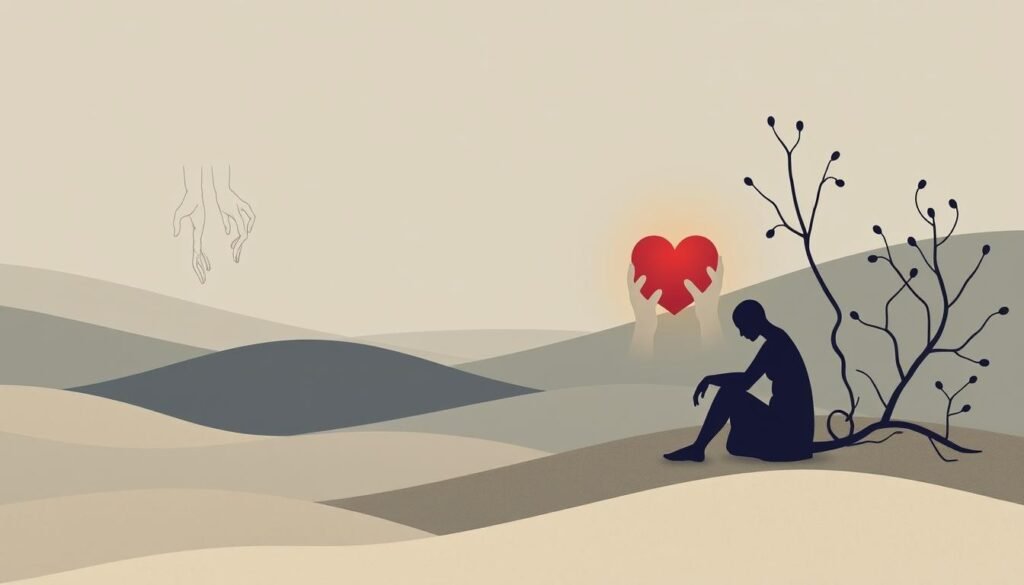More than 80% of people with rheumatoid arthritis (RA) feel very tired. This condition affects about 1% of people in Poland. It causes joint pain and a lot of fatigue. Between 41% and 80% of RA patients face serious tiredness at some time.
Knowing how rheumatoid arthritis links to fatigue is key. It really affects their day-to-day life and happiness. We’ll look at how they connect, their symptoms, reasons, and how to manage them. This will help improve life quality for those with RA.
Key Takeaways
- Over 80% of individuals with RA report fatigue as a significant symptom.
- Fatigue affects individuals at various stages of rheumatoid arthritis.
- Sleep disorders are prevalent among RA patients, impacting their overall health.
- Emotional and psychological factors can exacerbate fatigue in RA.
- Managing inflammation and pain is essential for reducing fatigue levels.
Understanding Rheumatoid Arthritis and Fatigue
Rheumatoid arthritis (RA) is an autoimmune disease that mainly targets the joints. It leads to inflammation, pain, and less movement. An important but often missed part is the constant fatigue many with RA feel. About half of the people with RA say they’re really tired all the time, even after resting.
This tiredness can get worse when the RA flares up. Studies show during these times, up to 80% might feel more fatigued. People say their tiredness is so bad, it stops them from doing everyday things. Interestingly, RA and its tiring effects are more common in women than in men.
Several factors make the tiredness worse: inflammation, low blood count, pain, and not moving much. These things make the tiredness go round in a circle, lowering life quality. Eating right, moving more, and good sleep can help break this cycle. Having fun can also make people feel better and more energetic.
| Factor | Impact on Fatigue |
|---|---|
| Inflammation | Increases fatigue levels |
| Anemia | Commonly exacerbates fatigue |
| Pain | Leads to mental and physical exhaustion |
| Inactivity | Contributes to muscle weakness |
| Poor sleep quality | Intensifies fatigue symptoms |
| Poor diet | Can worsen fatigue |
Knowing all about RA and tiredness helps in finding good ways to manage it. This can make life better for those who have it.
Does Rheumatoid Arthritis Cause Fatigue?
Many people with rheumatoid arthritis say they feel very tired. Over 70% report symptoms like in chronic fatigue syndrome. This tiredness isn’t just from the disease itself. It also comes from both body and mind issues linked together.
Around the world, 0.3% to 1.0% of people have rheumatoid arthritis. In India, that’s about 0.7% or 10 million people. Of them, 75% face ongoing extreme tiredness.
The link between the disease’s severity and feeling wiped out isn’t clear-cut. While you might think more inflammation means more fatigue, that’s not always true. Often, pain, poor sleep, and mental health issues like worry and sadness are closer to the problem. This makes us ask: Is rheumatoid arthritis to blame for the fatigue?
At least 50% of people with the disease say their tiredness is 5 out of 10 or more. This shows how big a part fatigue plays in their lives. They often feel more stressed than those with osteoarthritis, making it a complex issue.
Fatigue is a big worry for those living with the condition, affecting how they feel about life. Research keeps looking into how rheumatoid arthritis and fatigue are connected. This is key to finding better treatments and helping patients feel better.
Common Symptoms of Rheumatoid Arthritis Fatigue
Fatigue is a big issue for those with rheumatoid arthritis (RA). Over 90% of patients feel tired a lot, which really affects their day-to-day life. Knowing the signs of this fatigue helps manage it better.
Recognizing Rheumatoid Arthritis Fatigue Symptoms
The way fatigue shows up can differ from person to person. What many feel includes:
- Overwhelming exhaustion even after resting well.
- A reduced ability to do tasks, making easy things seem hard.
- Persistent tiredness that goes on for longer periods.
- Feeling wiped out even after not doing much in the day.
RA and Tiredness: What to Look For
Tiredness is a big part of RA. Signs of it might be:
- Hard time focusing or feeling mentally foggy.
- Not wanting to hang out with friends.
- A general feeling of unwellness, along with other symptoms.
Even good sleep doesn’t seem to fix this tiredness. It’s often made worse by ongoing inflammation, pain, and sometimes the drugs for RA. Spotting these signs of RA fatigue is crucial. It helps find ways to feel better.
Causes of Fatigue in Rheumatoid Arthritis
To understand why people with rheumatoid arthritis feel so tired, we must look at several factors. Inflammation and pain stand out as the main reasons for this tiredness. Mental health also plays a big part in making the exhaustion worse.
The Role of Inflammation and Pain
Inflammation deeply affects how much energy someone with rheumatoid arthritis might have. Higher inflammation means more fatigue. Around 70-80% of patients say tiredness is a major issue for them, often due to inflammation and chronic pain.
Nearly 60-70% of these individuals also have trouble sleeping well, which is made worse by their discomfort. This bad sleep can lead to even more rheumatoid arthritis exhaustion.
How Mental Health Impacts Fatigue
Mental health is big when it comes to how tired rheumatoid arthritis patients feel. Stress, anxiety, and depression can make someone feel even more tired. Studies show that taking care of these mental health issues can cut down tiredness by as much as 30%.
Psychological therapies, like cognitive behavioral therapy (CBT), can help a lot. They’ve been shown to boost mood and energy in about 40% of people. Talking to healthcare providers about mental health could be key in lessening fatigue.

| Factor | Impact on Fatigue |
|---|---|
| Inflammation | Higher levels correlate with increased fatigue |
| Pain | Chronic pain leads to exhaustion and sleep disturbances |
| Mental Health | Stress and anxiety can exacerbate feelings of tiredness |
| Sleep Quality | Poor sleep worsens fatigue levels |
| Exercise | Gentle activity can improve energy levels |
Measuring Fatigue in Rheumatoid Arthritis Patients
Finding the right way to measure fatigue in rheumatoid arthritis (RA) patients is tough. About 70% of people with RA feel very tired. Tools like the RA fatigue scales are often used. They have number scales and visual scales for patients to rate their tiredness.
These scales help show the doctors how tired the patients feel. It helps them link the tiredness to causes like bad sleep or medicine effects. One method used a visual scale. Here, the average score was 37.0 mm at the start. Also, 69% of patients said they were really tired at the start of studies.
Good news is, the number of patients feeling really tired dropped to 38% after 24 months. This shows that managing fatigue carefully can make a big difference. Checking fatigue regularly helps us understand what affects energy levels. It also shows how it changes the quality of life. Tools evaluating many aspects, like the Rheumatoid Arthritis Impact of Disease Score, are useful.
To wrap it up, measuring fatigue in RA needs careful attention. Using standard tools and tracking changes helps. It shows how treatment and lifestyle changes affect tiredness. For more tips on handling RA fatigue, check out this guide.
Correlation Between RA Activity and Fatigue
The link between RA activity and fatigue is complex. Studies show a connection, but its strength varies. People with rheumatoid arthritis often see their energy levels go up and down. This is due to various factors like pain, mental health, and how well they feel overall. Getting to know these aspects can help them tackle their symptoms better.
Understanding Disease Activity and Energy Levels
Around 40% to 80% of folks with RA feel very tired. This is much higher than the 10% seen in the general population. Up to 74% of these patients face high or increasing levels of fatigue. These numbers highlight how RA impacts both physical and day-to-day life.
How disease activity and fatigue link can range from a weak to moderate correlation. Blood tests for inflammation like CRP and ESR show a weak tie to fatigue. However, how much pain someone feels and how they rate their health show a stronger link. Pain getting worse over time plays a big role in increasing fatigue, showing a complex connection between RA activity and tiredness.
Sleep problems and mental health issues, say depression, can make fatigue worse. Studies find those with ongoing sleep troubles often don’t see their fatigue get better. Research says not getting enough sleep can raise fatigue levels. It suggests a need to manage RA symptoms broadly. The overlapping causes of pain and fatigue hint at a need for all-around treatment and lifestyle tweaks.

Learning about the factors behind fatigue can help people stay on top of their health. They might talk to their doctors about ways to manage better. Looking at RA from all angles can help improve their life quality. For more tips on dealing with rheumatoid arthritis fatigue, including treatment and lifestyle advice, click here.
Strategies to Manage Fatigue with Rheumatoid Arthritis
Fatigue is common in people with rheumatoid arthritis (RA), affecting many. Learning to handle it involves both exercise and good eating habits. These efforts can boost energy and improve life quality.
Exercise and Its Benefits
Exercise is key for RA-related fatigue. Aiming for 30 minutes of exercise five times a week helps. Swimming, yoga, and tai chi are good options. They’re easy on joints and relieve stress.
Exercising is not just for the body. It’s good for the mind too, helping beat tiredness. Always check with a doctor to find exercises that are safe.
Diet and Nutrition for Boosting Energy
Eating right is crucial for energy when you have RA. Foods high in omega-3s, whole grains, and lean proteins are best. They fight inflammation and might lessen fatigue. Drinking eight glasses of water a day is vital, especially when active. Adding foods that fight inflammation can boost energy levels.
It’s wise to get dietary advice from a healthcare provider. They can suggest what food is best for your RA.
For more on fighting fatigue with RA, check out online resources like helpful tips on managing rheumatoid arthritis.
Coping with Fatigue in Rheumatoid Arthritis
Fatigue is a huge challenge for those with rheumatoid arthritis. About 75% of RA patients face tiredness often. It’s crucial to find ways to cope to keep a good quality of life. One big help is having emotional support from friends, family, and doctors.
Emotional Support and Resources
Talking openly about fatigue helps others understand and support you. Sharing your struggles and needs creates a caring environment. Joining support groups or therapy sessions can also be helpful. They let you discuss feelings and find ways to deal with fatigue.
There are many resources to manage RA’s emotional side. Chronic fatigue often links to mental health issues like anxiety and depression. Knowing this can guide you to the right help.
- Connect with support groups: Joining a community can offer shared experiences and practical tips for coping with fatigue in rheumatoid arthritis.
- Open conversations: Discussing feelings of fatigue with trusted friends and family can lead to greater empathy and assistance.
- Seek professional help: Therapy options tailored to chronic illness can help individuals navigate emotional challenges related to fatigue.
- Utilize online resources: Various websites and forums provide valuable information and emotional support for those living with RA.

Rheumatoid Arthritis Energy Levels and Daily Life
Rheumatoid arthritis can make you feel really tired and affect your day-to-day life. Finding ways to manage your energy is key. About 70% of people experience constant tiredness. So, it’s important to discover how to deal with it.
Adjusting Lifestyle for Better Energy Management
Making some changes in how you live can help you handle your energy better when you have rheumatoid arthritis. Setting up a daily routine with plenty of rest is helpful. It’s good to plan out your activities. By breaking up tasks into smaller parts, you won’t feel too stressed.
Here are some helpful tips:
- Scheduled Rest: Taking breaks during the day helps avoid too much tiredness and saves energy.
- Balanced Nutrition: Eating foods full of important nutrients keeps you healthy and fights off fatigue.
- Stay Hydrated: Drinking lots of water throughout the day helps prevent tiredness caused by not having enough fluids.
- Moderate Exercise: Regular light workouts boost your energy. Doing moderate aerobic exercises a few times each week for 30-45 minutes is advised.
- Quality Sleep: Having a regular bedtime schedule helps you sleep better, which is crucial for managing energy.
Using these strategies and changing your lifestyle can boost your energy. This lets people with rheumatoid arthritis lead a more active and happy life.
Research and Ongoing Studies on RA and Fatigue
About 40–80% of people with rheumatoid arthritis (RA) experience deep fatigue. Studies are looking into how common this fatigue is and ways to manage it better. It’s found that severe fatigue affects half the individuals with RA, limiting their everyday activities.
Fatigue is a big reason for role limitations in 36–44% of cases. It also heavily affects physical and social functioning. Moreover, fatigue contributes to 64% of mental health symptoms in those with RA. Because of fatigue, 51% feel their health is getting worse.
Research has linked higher initial fatigue levels to more absenteeism after six months. This shows the importance of focusing on fatigue in RA research. By studying fatigue, we can better understand and fight RA. Explore more about the study of.
Chronic pain and inflammation are key factors behind fatigue, sometimes even more than joint pain itself. Over half of RA sufferers deal with mental and physical exhaustion. There is a move towards using cognitive therapies and better medications to help. Treatments like methotrexate and prednisone are showing promise in easing fatigue.
Recent studies highlight the benefits of physical activity and energy management to fight fatigue. Organizing daily tasks better can boost energy. This shows the growing focus on understanding and managing RA fatigue to improve lives.
Conclusion
Fatigue is a big problem for people with rheumatoid arthritis (RA). It really affects their life quality. RA causes chronic inflammation, which can lead to issues like anemia. This inflammation, pain, and sleep problems make people feel even more tired.
Understanding what causes this fatigue helps patients handle it better. They should plan activities, make priority lists, and set realistic daily goals. This approach helps them manage their energy better. It’s also key for patients to talk with their doctors about their fatigue. They can look into medications or lifestyle changes together. Having emotional support is crucial too.
By focusing on managing their fatigue, people with RA can live better. They use different strategies to fight fatigue. This way, they’re not just living with the fatigue. They’re improving their lives.